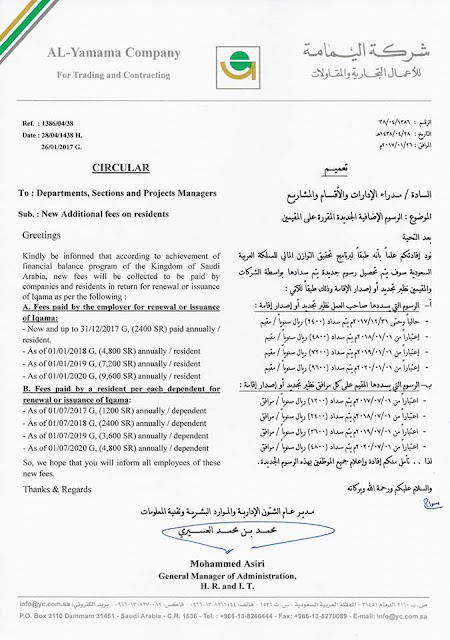In December of 2016, the Saudi Government has unveiled their 2017 Budget. It was a time of great upheaval in the kingdom as the price of oil remains very low and the government is losing money everyday. The budget was, by any account, revolutionary. As the Saudi Government works overtime to balance their declining finances, they started to look at other sources of income outside the oil industry.
Among the "new" sources of income is the imposition of new fees to the massive population of expatriates in the kingdom. One such levy is about to be implemented next month.
The Dependent's Fee is a 100-Riyal monthly fee levied for each dependent of an expatriate worker. It means, an expatriate worker (or his employer?) should pay an annual fee of SR1200.00 for EACH dependent living with the employee in the kingdom. The amount is said to be collected annually during Iqama (residency card) renewal. In 2018, the amount will double, then triple in 2019. By year 2020, the Dependent's Fee would be four times, or SR400 per month!
Among the "new" sources of income is the imposition of new fees to the massive population of expatriates in the kingdom. One such levy is about to be implemented next month.
The Dependent's Fee is a 100-Riyal monthly fee levied for each dependent of an expatriate worker. It means, an expatriate worker (or his employer?) should pay an annual fee of SR1200.00 for EACH dependent living with the employee in the kingdom. The amount is said to be collected annually during Iqama (residency card) renewal. In 2018, the amount will double, then triple in 2019. By year 2020, the Dependent's Fee would be four times, or SR400 per month!
 |
| A page from the Fiscal Balance Program - Balanced Budget 2020 |
OFWs in Saudi are starting to share the information that their companies are giving out memos to expatriate workers regarding the Dependent's Fee. Expatriates have sent images of such notices to friends and relatives using What's App or FB Messenger. Most pictures taken does not show the company logo, perhaps to avoid a backlash from the employer, but some contain the company logos, which gives more credence to the report.
Check out the images below so you can judge for yourself. We have tried several times to verify the story, but knowing the Saudi Government, any official announcement regarding this issue is done only via the Ministry of Interior.
Check out the images below so you can judge for yourself. We have tried several times to verify the story, but knowing the Saudi Government, any official announcement regarding this issue is done only via the Ministry of Interior.
The number of OFWs with dependents in Saudi Arabia is currently unclear. One thing is for sure, if this plan continues, then their numbers will surely decrease.
As such, the Philippine government should also prepare for a surge of Filipino OFWs and their dependents, most of whom will surely go home in the next few years.
sources: ArabNews, Saudi Gazette
©2017 THOUGHTSKOTO
SEARCH JBSOLIS, TYPE KEYWORDS and TITLE OF ARTICLE at the box below





